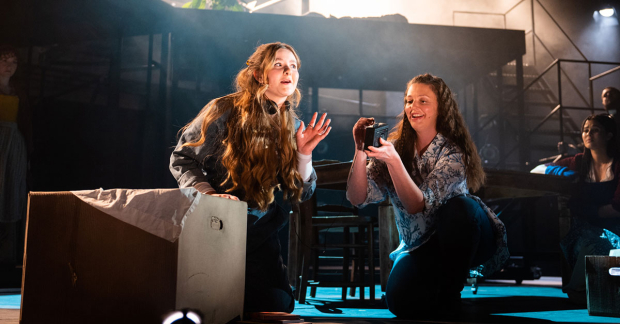”A Mother’s Song” at Macrobert Arts Centre, Stirling – review

© Tommy Ga Ken Wan
Finn Anderson and Tania Azevedo, the co-creators of A Mother’s Song, deserve a medal and a spell in a recuperation chamber for achieving the all-but-impossible task of getting a new musical professionally staged in contemporary Scotland. The result may be full of problems, with shonky dramatic structure and patchy songs, but its heart is firmly in the right place, and I always felt warmly towards it despite its issues.
A Mother’s Song bills itself as a folk musical, and folk songs are central to its plot as well as its music. The story focuses on three generations of women separated by several centuries, each of whom face their own particular struggles with pregnancy and childbirth. Their parallel stories converge on Sarah and Alix, a couple in modern day Brooklyn who have just moved into their first apartment. As part of the move Sarah uncovers a box she inherited from her Aunt Betty back home in West Virginia, that she has never had the courage to open. It reveals Aunt Betty’s research into the folk songs and ballads that travelled from Scotland and Ireland to the Appalachians, and the link to Sarah’s own family makes her ask questions about her future.
The multi-generational story might not be original – just look at Stephen Daldry’s The Hours – but it’s not a bad idea. Each generation is nicely sketched, including some bold use of Scots language that would likely fox listeners south of the border, and the various characters are fairly well observed. Aspects of it are very clunky, though, not least the central idea that such a massive journey of character development should be sparked by the MacGuffin of a few tapes left by a deceased auntie. There’s a bit too much reliance on histrionic cliff-hangers, too, such as a bride who runs away on her wedding day, and a subplot about stealing from the church collection, both of which feel like offcuts from a rejected EastEnders script.
That said, the performances are committed, particularly from the two pregnant mothers in the group, Blythe Jandoo’s wide-eyed Jean and Kirsty Findlay’s fearful Cait. Melanie Bell as Aunt Betty and Bethany Tennick as Sarah are both rather one-note, but both Tinashe Warikandwa and Craig Hunter do sterling work in several different roles.
The songs are a mixed bag, too. Composer Finn Anderson uses some traditional ballads in his score, such as “The Four Marys” or “Handsome Molly”, and the original songs are at their best when they stick closest to the mood of those folk originals. “The Prologue” and “Epilogue”, for example, are foot-tapping earworms, and there are some cracking bluegrass moments in the second act. Against that, however, there’s also a rocky karaoke number that falls pretty flat, and some repetitious ensemble numbers that contain a lot of note-spinning.
Anderson’s overall achievement, however, is to create some impressive atmosphere, and his music is brought to life really strongly by the onstage band. Tania Azevedo, the show’s co-creator and director, struggles to get the ensemble to do much more than standing and looking, but Emma Bailey’s set designs are flexible, and her costumes handsome.
So there are a lot of problems, but there’s the germ of something really impressive here. In spite of the weaknesses this is a show which has a lot of promise, and with some trimming of the songs and some refining of the plot, it could find a strong audience.












